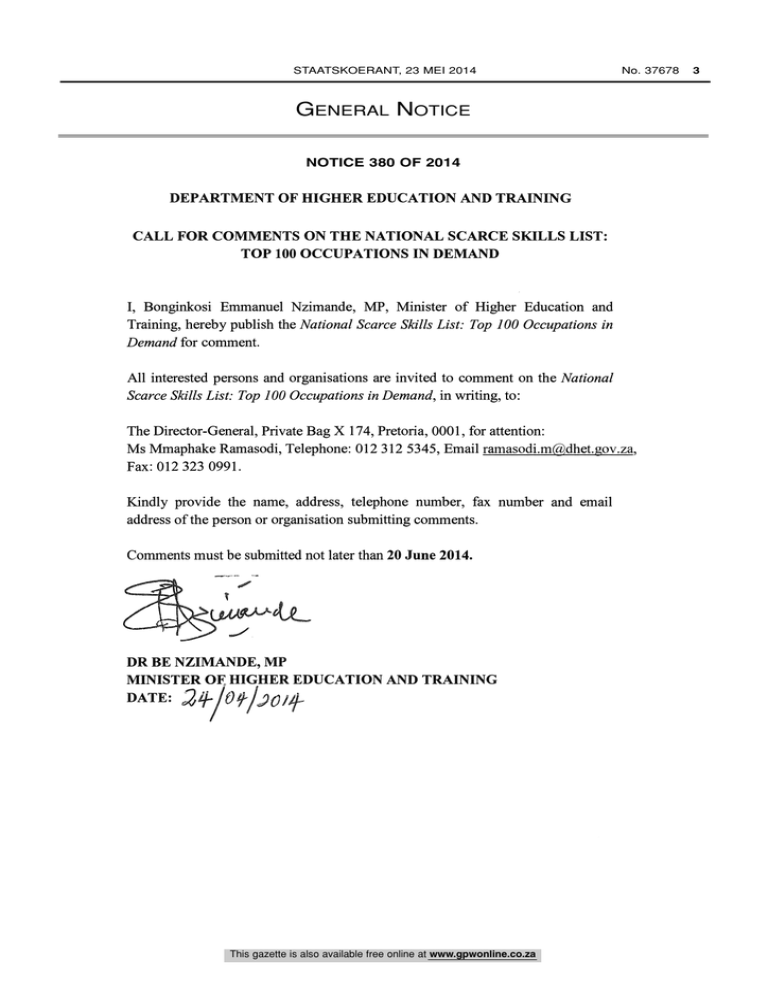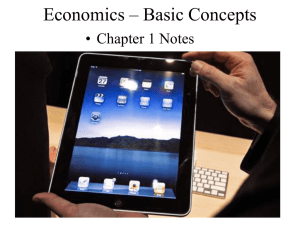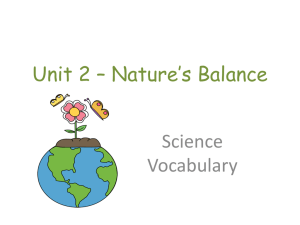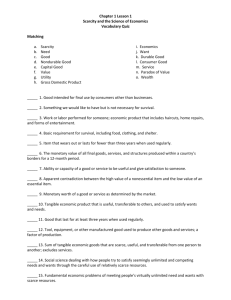National Scarce Skills List: Top 100 Occupations in Demand
advertisement

STAATSKOERANT, 23 MEI 2014 No. 37678 GENERAL NOTICE NOTICE 380 OF 2014 DEPARTMENT OF HIGHER EDUCATION AND TRAINING CALL FOR COMMENTS ON THE NATIONAL SCARCE SKILLS LIST: TOP 100 OCCUPATIONS IN DEMAND I, Bonginkosi Emmanuel Nzimande, MP, Minister of Higher Education and Training, hereby publish the National Scarce Skills List: Top 100 Occupations in Demand for comment. All interested persons and organisations are invited to comment on the National Scarce Skills List: Top 100 Occupations in Demand, in writing, to: The Director-General, Private Bag X 174, Pretoria, 0001, for attention: Ms Mmaphake Ramasodi, Telephone: 012 312 5345, Email ramasodi.m@dhet.gov.za, Fax: 012 323 0991. Kindly provide the name, address, telephone number, fax number and email address of the person or organisation submitting comments. Comments must be submitted not later than 20 June 2014. DR BE NZIMANDE, MP MINISTER OF HIGHER EDUCATION AND TRAINING DATE: 4/0 fpc This gazette is also available free online at www.gpwonline.co.za 3 4 No. 37678 GOVERNMENT GAZETTE, 23 MAY 2014 NATIONAL SCARCE SKILLS L1ST: TOP 100 OCCUPATIONS IN DEMAND Draft for public comment. higher education & training Department: Higher Education and Training REPUBLIC OF SOUTH AFRICA National Scarce Skills List - Version 20 May 2014 This gazette is also available free online at www.gpwonline.co.za 11 Page STAATSKOERANT, 23 MEI 2014 No. 37678 ABBREVIATIONS DHA Department of Home Affairs DHET Department of Higher Education and Training DPRU Development Policy Research Unit DoL Department of Labour EDD Department of Economic Development HRD Human Resource Development HRDCSA Human Resource Development Council of South Africa HSRC Human Sciences Research Council IPAP Industrial Policy Action Plan JIPSA Joint Initiative on Priority Skills Acquisition JOUR Job Opportunities and Unemployment Report NDP National Development Plan NGP New Growth Path NSDS National Skills Development Strategy SETA Sector Education and Training Authority SIPs Strategic Integrated Projects SSP Sector Skills Plan TTT Technical Task Team OFO Organising Framework of Occupations National Scarce Skills List - Version 20 May 2014 21 Page This gazette is also available free online at www.gpwonline.co.za 5 6 No. 37678 GOVERNMENT GAZETTE, 23 MAY 2014 CONTENTS 1. INTRODUCTION 4 2. PURPOSE 4 3. LIFESPAN OF LIST 5 4. KEY CONCEPTS 5 5. UTILITY OF NATIONAL SCARCE SKILLS LIST 6 6. PROCESSES FOLLOWED IN COMPILING THE NATIONAL LIST OF SCARCE SKILLS 7 7. INFORMATION SOURCES 8 8. CONSULTATIONS 9 9. KEY FINDINGS 9 10. RANKING SCORECARD FOR NATIONAL SCARCE SKILLS LIST (2014) 13 11. NATIONAL SCARCE SKILLS LIST (2014) 14 REFERENCES 17 ANNEXURE A: CLUSTER OF OCCUPATIONS 18 National Scarce Skills List - Version 20 May 2014 3I Page This gazette is also available free online at www.gpwonline.co.za STAATSKOERANT, 23 MEI 2014 1. 1.1 No. 37678 INTRODUCTION The White Paper for Post-School Education and Training (DHET, November 2013) asserts that "if the provision of education and training is to be better coordinated with the needs of society and the economy, central information about skills needs is required". Therefore "identifying current and future skills demand as accurately as possible is extremely important if the goals of the National Development Plan, the New Growth Path and the Industrial Policy Action Plan are to be achieved". 1.2 The White Paper (DHET, November 2013) notes further that the identification of skills needs can be used to inform human resource planning, funding allocations, programme development, and immigration strategies. 1.3 The Human Resource Development Strategy of South Africa (HRDSA) 2010 - 2030 (RSA, 2009), emphasises the need for a national "scarce skills list" which is aligned to South Africa's social and economic priority goals. 1.4 The Immigration Amendment Act of 2011 (RSA, 2011) compels the Minister of Home Affairs to compile a "critical skills list" to facilitate the issuing of work visas. The Department of Home Affairs could draw on the national "scarce skills list" to compile its own critical skills list. 1.5 Numerous reports have drawn attention to the problems experienced by Government, as well as the private sector, in implementing planned growth strategies, fast-tracking service delivery and producing high quality products and services owing to a lack of skilled people. 1.6 It is evident from the above that information about scarce skills is of vital importance for a variety of reasons. These imperatives have necessitated the Minister of Higher Education and Training to produce this National Scarce Skills List. 2. PURPOSE 2.1 This document provides a list of the top 100 occupations in the country that are considered to be in short supply, accompanied by an explanation of the methods and processes followed in compiling the list. 2.2 The purpose of the list to inform, inter alia: human resource planning and development; resource allocation and prioritisation; the development of relevant is qualifications, programmes and curricula; and international recruitment strategies. National Scarce Skills List - Version 20 May 2014 4I Page This gazette is also available free online at www.gpwonline.co.za 7 8 No. 37678 GOVERNMENT GAZETTE, 23 MAY 2014 3. LIFESPAN OF LIST 3.1 The National Scarce Skills List will be reviewed every 2 years, unless the Minister of Higher Education and Training deems it necessary to review the list earlier. 3.2 The formulation of the National Scarce Skills List should be viewed as a dynamic process that is subject to further continuous iterations and methodological improvements based on substantive proposals from the public. 4. KEY CONCEPTS The following concepts are used in this Notice: 4.1 SCARCE SKILLS refer to those occupations in which there are a scarcity of qualified and experienced people, currently or anticipated in the future, either (a) because such skilled people are not available or (b) they are available but do not meet employment criteria. This scarcity can arise from one or a combination of the following, grouped as relative or absolute: a) Absolute scarcity: suitably skilled people are not available, for example: A new or emerging occupation, where there are few, if any, people in the country with the requisite skills (qualification and experience) and where education and training providers have yet to develop learning programmes to meet the skills requirements. In this instance, firms, sectors and even the country are unable to implement planned growth strategies and are experiencing productivity, service delivery and quality problems directly attributable to a lack of skilled people. Replacement demand would reflect an absolute scarcity where there are no people enrolled or engaged in the process of acquiring the skills that need to be replaced. b) Relative scarcity: suitably skilled people are available but do not meet other employment criteria, such as: Geographical location, where there are qualified people, but they are unwilling to work outside of urban areas. Equity considerations, where there are few, if any, candidates with the requisite skills (qualifications and experience) from specific groups available to meet the skills requirements of firms and enterprises. National Scarce Skills List - Version 20 Ma 2014 5 This gazette is also available free online at www.gpwonline.co.za Pa e STAATSKOERANT, 23 MEI 2014 No. 37678 Replacement demand would reflect a relative scarcity if there are people in education and training (formal and work-place) who are in the process of acquiring the necessary skills (qualification and experience) but where the lead time will mean that they are not available in the short term to meet replacement demand. 4.2 OCCUPATION refers to a set of jobs or specialisations whose main tasks are characterised by such a high degree of similarity that they can be grouped together for the purposes of classification. The occupations identified in the Organising Framework of Occupations (0F0) therefore represent a category that could encompass a number of jobs or specialisations, e.g. the occupation "General Accountant" would also cover the specialisations "Financial Analyst" and "Insolvency Practitioner". Occupations are classified according to two main criteria: (a) skill level and (b) skill specialisation, where skill is used in the context of competency rather than a description of tasks or functions. 4.3 SKILL is defined as "the necessary competencies that can be expertly applied in a particular context for a defined purpose" and "competence" has three elements: a) b) c) 4.4 Practical competence - the ability to perform a set of tasks; Foundational competence - the ability to understand what we ourselves or others are doing and why; and Reflexive competence - the ability to integrate or connect our performance with an understanding of the performance of others, so that we can learn from our actions and are able to adapt to changes and unforeseen circumstances. ORGANISING FRAMEWORK OF OCCUPATIONS is a skill-based coded classification system, which encompasses all occupations in the South African context. The classification of occupations is based on a combination of skill level and skill specialisation which makes it easy to locate a specific occupation within the framework. 4.5 JOB refers to a set of tasks and duties carried out or meant to be carried out, by one person for a particular employer, including self-employment. 5. UTILITY OF NATIONAL SCARCE SKILLS LIST The National Scarce Skills List can be used to support decision-making with respect to: supply-side planning undertaken by public and private education and training institutions (Universities, Further Education and Training Colleges and Adult Education and Training Centres); National Scarce Skills List - Version 20 May 2014 This gazette is also available free online at www.gpwonline.co.za 6I Page 9 10 No. 37678 GOVERNMENT GAZETTE, 23 MAY 2014 the development of labour market-relevant programmes and qualifications; the determination of funding norms for the programme-qualification mix; prioritising student funding through institutions such as the National Student Financial Aid Scheme; the identification of skills programmes that are facilitated by Sector Education and Training Authorities (SETAs) and to inform SETA support for bursaries, internships, learnerships and artisan training; the identification of training programmes offered by private providers and parastatals; career advisory services; sector, industry, regional and employer plans; and immigration policies (namely, the issuing of work visas). 6. PROCESSES FOLLOWED IN COMPILING THE NATIONAL LIST OF SCARCE SKILLS The processes followed in compiling the National Scarce Skills List is as follows: STEP ONE Agreement on terms of reference for the compilation of National Scarce Skills List. STEP TWO STEP THREE STEP FOUR STEP FIVE STEP SIX STEP SEVEN STEP EIGHT STEP NINE STEP TEN 7. Formation of an Advisory Committee to provide inputs to the research. Conduct the research. Interviews with a sample of employer association representatives. Presentation of draft findings to the Advisory Committee for feedback. Review and revision of feedback from Advisory Committee. Gazetting of National Scarce Skills List (2014) for public comment. Review of public comments and revision of National Scarce Skills List (2014). Publication of National Scarce Skills List (2014). Dissemination of final National Scarce Skills List (2014) to public. INFORMATION SOURCES The following sources of information were used in the compilation of the National Scarce Skills List: National Scarce Skills List - Version 20 May 2014 This gazette is also available free online at www.gpwonline.co.za 7I Page STAATSKOERANT, 23 MEI 2014 No. 37678 7.1 Report of the Joint Initiative on Priority Skills Acquisition (JIPSA) published by the Presidency in March 2010. 7.2 The Scarce and Pivotal Skills Lists (2013/2014) compiled by SETAs. 7.3 The Scarce Skills List compiled by the Strategic Integrated Projects (SIPs) (2013/2014) compiled by the Department of Higher Education and Training (DHET), in August 2013. 7.4 The New Growth Path (2010) produced by the Department of Economic Development. 7.5 The Industrial Policy Action Plan 2 2012/13 - 2014/15 (2012) produced by the Department of Trade and Industry. 7.6 The National Development Plan (2012) produced by the National Planning Commission. 7.7 The Human Resource Development Strategy for South Africa (2010) produced by the Human Resource Development Council of South Africa (HRDCSA). 7.8 A report, Job Opportunities and Unemployment in the South African Labour Market 2011-2012 (2013) produced by the Department of Labour. 7.9 Research Paper: Key issues in improving the quantity and quality of professionals in South Africa produced by the HRDCSA (2012). 7.10 Research Paper: Occupational shifts and shortages: skills challenges facing the South African economy (2013) produced by the Development Policy Research Unit (DPRU). 7.11 Research Paper: Growth, employment and skills: the New Growth Path revisited (2013) produced by the DRPU. 7.12 A report on salaries in South Africa (2013) produced by Career Junction. 7.13 Group discussions and interviews were held with key professional bodies and other stakeholders in February 2014 to test preliminary findings. It is evident from the above, that a comprehensive and diverse range of information sources was employed and triangulated using a rigorous methodological approach, to establish the National Scarce Skills List (2014) consisting of the top 100 scarce skills in the country. National Scarce Skills List - Version 20 May 2014 8I Page This gazette is also available free online at www.gpwonline.co.za 11 12 No. 37678 8. GOVERNMENT GAZETTE, 23 MAY 2014 CONSULTATIONS Representatives from a number of organisations were consulted in the process of verifying the list of scarce skills, including: the Department of Home Affairs, the Department of Trade and Industry, the Department of Economic Development, the Department of Labour, the Human Sciences Research Council, the Department of Public Service and Administration, Development Policy Research Unit (University of Cape Town), the SA Institute of Electrical Engineers, the SA Institute of Steel Construction, several Sector Education and Training Authorities, the Engineering Council of South Africa and the Engineering Industries Federation of South Africa. 9. 9.1. KEY FINDINGS Joint Initiative on Priority Skills Acquisition (JIPSA): JIPSA was established in 2006 as an initiative of the Accelerated and Shared Growth Initiative for South Africa to deal with the supply of priority skills to the economy. It identified the following five priority skills areas for immediate attention: High-level, world-class engineering and planning skills for the "'network industries", namely transport, communications, water and energy; City, urban and regional planning and engineering skills; Artisanal and technical skills, with priority attention to infrastructure development, housing and energy, and in other areas identified as being in strong demand in the labour market; Management and planning skills in education and health; and Mathematics, science and language competence in public schooling. In addition, JIPSA made proposals to prioritise skills initiatives in the fields of tourism, information and communication technology, business process outsourcing and bio-fuels. The priority skills defined in the JIPSA process were driven by the political imperative for infrastructure development and job creation. Over a four-year period, between 2006 and 2009, the JIPSA process laid important foundations for the future of human resource development in South Africa. 9.2. Industrial Policy Action Plan 2012/13 - 2014/15 (IPAP 2): IPAP 2 of the Department of Trade and Industry represents a crucial component of the overall industrial strategy of the country. IPAP 2 has identified 3 sectors for leveraging market growth and associated upgrading of supply capacity and capability: Green industry: the manufacturing of componentry inputs into the renewable energy generation programme and solar power heating and other industrial opportunities arising from requirements of high energy efficiency in the economy; National Scarce Skills List - Version 20 May 2014 9I This gazette is also available free online at www.gpwonline.co.za Page STAATSKOERANT, 23 MEI 2014 No. 37678 Agro-processing: including expediting regulatory and support mechanisms to establish a large-scale bio-fuels industry; identification and promotion of export market opportunities in net food-importing countries; and product development and standards support; and Fabrication, capital and transport equipment: leveraging large-scale procurement in rail and electricity, providing associated upgrading support; and taking advantage of mining capital equipment investment locally and on the rest of the continent. IPAP 2 acknowledges that the availability of skilled people is vital to support growth in these sectors. 9.3 National Development Plan (NDP): The NDP (2010-2030) is an all-encompassing plan that offers a long-term perspective across all spheres of South African society. It identifies the role that different sectors should play in overcoming poverty and inequality and reducing unemployment, and the implications these have for skills development. It foregrounds the following in respect to skills needs: Public service delivery: the aim is to professionalise the public service to strengthen service delivery. It focuses on the need to improve the technical and managerial skills of public servants. The NDP highlights the fact that there are critical shortages of good-quality doctors, engineers, information technology professionals, forensic specialists, detectives, planners, accountants, prosecutors, curriculum advisors, among others, in the public service; Sustainable Livelihoods: provision of life skills programmes, entrepreneurship and community development programmes; Education and Training: increasing the pool of mathematics and science teachers at all levels in the system; Research and Development: increasing the skills pool of scientists, including the number of PhDs, for knowledge production and innovation; Public infrastructure: increase the number of engineers, technologists, technicians and artisans to support the roll-out of public programmes; and Health professionals: increasing the number of doctors and nurses. 9.4 New Growth Path (NGP): The New Growth Path is a bold, imaginative and effective strategy to create the millions of new jobs South Africa needs. The strategy sets out critical markers for employment creation and growth and identifies where viable changes in the structure and character of production can generate a more inclusive and greener economy over the medium to long run. Engineers: Target at least 30 000 additional engineers by 2014, changing subsidy formulae for universities as appropriate; National Scarce Skills List - Version 20 May 2014 This gazette is also available free online at www.gpwonline.co.za 10 I P a g e 13 14 No. 37678 GOVERNMENT GAZETTE, 23 MAY 2014 Artisans: Target at least 50 000 additional artisans by 2015, with annual targets for state-owned enterprises; Workplace skills: Improve skills in every job and target 1, 2 million workers for certified on-the-job skills improvement programmes annually from 2013; Further education and training (FET) colleges: Colleges have a central role in providing important middle-level skills for young people; and Information and communications technology (ICT) skills: The departments of education should ensure that computer skills are taught in all secondary schools and form part of the standard adult basic education and training (ABET) curriculum by 2015. All public servants should also receive ICT training. 9.5 Strategic Integrated Projects (SIPs): The South African Government adopted a National Infrastructure Plan in 2012, which aims to transform the economic landscape while simultaneously creating significant numbers of new jobs, and strengthening the delivery of basic services. The plan also supports the integration of African economies. Government will over 3 years from 2013/14 invest R827 billion in building new and upgrading existing infrastructures. These investments will improve access by South Africans to healthcare facilities, schools, water, sanitation, housing and electrification. On the other hand, investment in the construction of ports, roads, railway systems, electricity plants, hospitals, schools and dams will contribute to faster economic growth. This work has been organised into 18 Strategic Integrated Projects (SIPs) each of which has a dedicated SIP Coordinator to oversee the implementation and coordination of the numerous discrete projects that fall under each one. The skills shortages identified in SIPs relate wholly to the engineering and built environment fields. There is a dire shortage of engineers, technologists, technicians and artisans across a range of disciplines. 9.6 Job Opportunities and Unemployment Report 2011-2012 (JOUR): The Department of Labour (DoL) provides an analysis of the number of vacancies recorded in the print media against the claims it receives by unemployed persons in relation to the Unemployment Insurance Fund (UIF). The outcome of this analysis signals skills mismatches that exist in the South African labour market. Some occupations with a high number of vacancies include: various types of managers, senior officials in the public sector, engineers, technicians, artisans, mathematics and science teachers and Information technology (IT) professionals. National Scarce Skills List - Version 20 May 2014 11 I Page This gazette is also available free online at www.gpwonline.co.za STAATSKOERANT, 23 MEI 2014 9.7 No. 37678 HRDC report on the Production of Professionals (2013): The HRDC established a Technical Task Team (TTT), to identify challenges related to the supply of professionals in South Africa, and for the development of interventions that could address certain shortfalls. The Task Team's report focuses on a number of professions, taking into account national needs, as well as skills scarcities. The report compares the numbers of skilled professionals in South Africa in relation to population size, with the ratios obtaining in a number of other, comparator countries. While there are certain caveats concerning the data, it is clear that there is a large gap with respect to the numbers of professionals in SA, which needs to be addressed. In addition to a comparative study, the report also draws on previous research, interviews with professional bodies and reports from various forums. The HRDC report highlights the need for the production of professionals in the following fields: engineering, mining, health care and the built environment. 9.8 SETA Scarce Skills List (2013): SETAs develop Sector Skills Plans (SSPs) which are essentially a human resource development plan for their respective sector. A key requirement of the SSP is to identify and list scarce skills in the designated sector. The SETA scarce skills lists represent the research findings of SETAs and are approved by employers, as well as labour. The list of occupations identified by each of the 21 SETAs as being scarce, were scored and weighted in line with the methodology described above. 9.9 Pivotal Skills List (2013): In 2013, in addition to their sectorally-based scarce skills lists, SETAs also generated a pivotal skills list which refers to the top ten ranked occupations on the SETA Scarce Skills List. Pivotal skills are earmarked for the pivotal grant funding mechanism of the DHET. The list of ten occupations identified by each of the 21 SETAs as being "pivotal," were scored and weighted in line with the methodology described above. 9.10 Salary and Wage Analysis (2013/2014): Salary and wage analysis was conducted to determine occupational trends. The CareerJunction (November 2013) website indicated high salary and wage growth for occupations in the top 100 list, well above inflation in many instances. Growth was strong for engineers, project managers, medical personnel, artisans and IT professionals. This data was used to corroborate the findings of occupations in this National Scarce Skills List (2014). National Scarce Skills List - Version 20 May 2014 12 I Page This gazette is also available free online at www.gpwonline.co.za 15 16 No. 37678 GOVERNMENT GAZETTE, 23 MAY 2014 RANKING SCORECARD FOR NATIONAL SCARCE SKILLS LIST (2014) The process of allocating scores and weights to establish the Top 100 occupations in high demand is set out as follows: POINTS ALLOCATION MAXIMUM SCORE SSP Scarce Skills List (2013): 1 point is allocated to an occupation if it is identified in a specific SETA 10 NO 1 2 3 Scarce Skills List (21 SETAs). Pivotal Skills List (2013): 2 points are allocated to an occupation if it is identified in a specific SETA Scarce Skills List (21 SETAs). The breakdown is as follows: Identified 5 times by SETAs 20 Identified 4 times by SETAs 16 Identified 3 times by SETAs 12 Identified 2 times by SETAs 8 Identified 1 time by a SETA 4 JIPSA: 10 points each are allocated to an occupation if 20 10 it is identified in JIPSA. 4 NDP: 5 points are allocated to an occupation if it is 5 identified in the NDP. 5 IPAP2: 5 points are allocated to an occupation if it is 5 identified in IPAP2. 6 7 JOUR: Points are allocated to an occupation if it is 10 identified in the index. The breakdown is as follows: +1000 vacancies 10 900-999 vacancies 9 800-899 vacancies 8 7 700-799 vacancies 600-699 vacancies 6 5 500-599 vacancies 400-499 vacancies 4 300-399 vacancies 3 200-299 vacancies 2 100-199 vacancies 1 Profession: 20 points are allocated to a profession if it is identified as scarce. 20 8 SIPs: 10 points are allocated to an occupation if it is 10 9 identified as scarce in the SIPs List. Study Duration: 10 points are allocated 10 if an occupation requires a minimum of 3 years of formal study. TOTAL 100 National Scarce Skills List - Version 20 May 2014 13IPage This gazette is also available free online at www.gpwonline.co.za STAATSKOERANT, 23 MEI 2014 10. No. 37678 NATIONAL SCARCE SKILLS LIST (2014) NO 1 2 3 4 5 6 8 10 11 12 14 15 16 17 18 20 22 23 24 25 27 29 33 35 OCCUPATIONAL TITLE Electrical Engineer Civil Engineer Mechanical Engineer Quantity Surveyor Programme or Project Manager Finance Manager Physical and Engineering Science Technicians* Industrial and Production Engineers* Electrician Chemical Engineer Construction Project Manager Mining Engineer Accountant (General) Energy Engineer Materials Engineer Electronics Engineer Metallurgical Engineer Medical Superintendent / Public Health Manager Telecommunications Engineers* Energy Engineering Technologist Millwright Public Health Physician Nursing Professionals* OR) CODE 215101 214201 214401 214904 121905 121101 311 2141 671101 214501 132301 214601 241101 215103 214907 215201 214603 134201 2153 215104 671202 221103 2221 Registered Nurse (child and family health) General Medical Practitioner Veterinarian Industrial Pharmacist ICT Systems Analyst Geologist Hospital Pharmacist Boiler Maker Fitter and Turner Carpenter and Joiner Welder Environmental Engineers* Retail Pharmacist 332102 221101 225101 226202 251101 211401 226201 651302 652302 641501 651202 2143 226203 National Scarce Skills List - Version 20 May 2014 This gazette is also available free online at www.gpwonline.co.za 14IPage 17 18 No. 37678 GOVERNMENT GAZETTE, 23 MAY 2014 37 43 45 48 52 56 62 66 72 78 79 Manufacturing Managers* SHEQ Practitioner Vocational or Further Education Teachers* Natural Science Teacher (Grade 10-12) Plumber (General) Automotive Motor Mechanic Agricultural Engineer Foundational Phase School Teacher Mechanical Engineering Technologist Software Developers* Toolmaker Electrical Engineering Technologist Land Surveyor Diesel Mechanic Electronic Instrument Trades Worker Sales and Marketing Manager Mathematics Teacher (Primary) Metal Fabricator Industrial Machinery Mechanic Draughtsperson Actuary Agricultural Scientist Retail Buyer Air Conditioning and Mechanical Services Plumber Automotive Electrician Supply and Distribution Manager Civil Engineering Technologist Materials Engineering Technologist Electrical Installation Inspector ICT Project Manager Mining Engineering Technologist Metallurgical Engineering Technologist Electronics Engineering Technologist Computer Network and Systems Engineer Mechatronics Technician Research and Development Manager Chemical Engineering Technologist Architect Mathematics Teacher (Grades 10 to 12) Pressure Welder Retail Manager (General) Earthmoving and Related Plant Operators* Computer Network Technician 1321 226302 2321 233102 642601 653101 214905 234101 214402 2512 652201 215102 216502 653102 672105 122101 233101 651401 653301 311801 212101 213202 332301 642701 672106 132401 214202 214908 671102 133102 214602 214604 215202 252301 671203 122301 214502 216101 232123 651201 142103 7342 351301 National Scarce Skills List - Version 20 Ma 2014 This gazette is also available free online at www.gpwonline.co.za 15 Pare STAATSKOERANT, 23 MEI 2014 80 86 90 93 97 99 100 Personnel / Human Resource Manager Environmental Manager Production/Operations Manager Urban and Regional Planner Network Analyst Industrial Designer Local Authority Manager Financial Investment Advisor Health and Safety Manager Water Quality Analyst Logistics Chief Information Officer Occupational Instructor / Trainer Corporate General Manager External Auditor Ship's Engineer Rigger Forestry Technician Retail Manager (General) Quality Systems Manager Medical Scientist No. 37678 121201 134901 134915 216401 252302 216302 111203 241301 121206 213306 132402 133101 242402 121901 241104 315101 651501 314301 142103 121908 213110 *Refers to a cluster of occupations in this OFO category. Refer to Annexure A for specific occupations under these clusters. NOTE: Chartered accountants are an occupation in high demand. However, these professionals work in a range of occupations such as, but not limited to, CEOs, CFOs, financial managers, financial analysts, audits, project managers, general managers, and so. Thus the occupational title CA is not listed. National Scarce Skills List - Version 20 May 2014 This gazette is also available free online at www.gpwonline.co.za 16 I P a g e 19 20 No. 37678 GOVERNMENT GAZETTE, 23 MAY 2014 REFERENCES Bhorat, H; Goga, S & Stanwix, B (2013). Occupational shifts and shortages: skills challenges facing the South African economy. Cape Town: DPRU. Bhorat, H and Tian, N. 2013. Growth, employment and skills: the New Growth Path revisited. Cape Town: DPRU. Career Junction. 2013. Salaries in South Africa. www.cji.co.za Department of Economic Development (2010). The New Growth Path: agenda. Pretoria: EDD. Department of Higher Education and Training (2012). White Paper for Post-School Education and Training. Pretoria: DHET. Department of Higher Education and Training (2013). Organising Framework of Occupations. Pretoria: DHET. Department of Higher Education and Training (2013). Learning pathways for SIPs scarce skills. Pretoria: DHET. Department of Labour. 2013. Job Opportunities and Unemployment in the South African Labour Market 2011-2012. Pretoria: DoL. Department of Trade and Industry 2011/12 - 2013/14. (2012). Industrial Policy Action Plan 2. Pretoria: DTI. Human Resource Development Council of SA. 2010. Human Resource Development Strategy for South Africa (2010 - 2030). HRDCSA: Pretoria. Human Resource Development Council of SA. 2012. Key issues in improving the quantity and quality of professionals in South Africa. HRDCSA: Pretoria. National Planning Commission. 2012. National Development Plan 2030. Pretoria: NPC. The Presidency. 2010. Joint Initiative on Priority Skills Acquisition, March. Pretoria: The Presidency. National Scarce Skills List - Version 20 May 2014 17 I P a g e This gazette is also available free online at www.gpwonline.co.za STAATSKOERANT, 23 MEI 2014 No. 37678 ANNEXURE A: CLUSTER OF OCCUPATIONS 1321 Manufacturing Managers 132101 Manufacturer 132102 Production / Operations Manager (Manufacturing) 132104 Engineering Manager 132105 Power Generation Production / Operations Manager 2141 Industrial and Production Engineers 214101 Industrial Engineer 214102 Industrial Engineering Technologist 214103 Production Engineer 214104 Production Engineering Technologist 2143 Environmental Engineers 214301 Environmental Engineer 214302 Environmental Impact and Restoration Analyst 2153 Telecommunications Engineers 215301 Telecommunications Engineer 215302 Telecommunications Engineering Technologist 215303 Telecommunications Network Engineer 215304 Telecommunications Field Engineer 2221 Nursing Professionals 222101 Clinical Nurse Practitioner 222102 Registered Nurse (Aged Care) 222103 Registered Nurse (Child and Family Health) 222104 Registered Nurse (Community Health) 222105 Registered Nurse (Critical Care and Emergency) 222106 Registered Nurse (Developmental Disability) 222107 Registered Nurse (Disability and Rehabilitation) 222108 Registered Nurse (Medical and Surgical) 222109 Registered Nurse (Medical Practice) 222110 Registered Nurse (Mental Health) 222111 Registered Nurse (Preoperative) 222112 Registered Nurse (Surgical) 222113 Paediatrics Nurse 222114 Nurse Educator 222115 Nurse Researcher 222116 Nurse Manager National Scarce Skills List - Version 20 Ma 2014 18 This gazette is also available free online at www.gpwonline.co.za 21 22 No. 37678 GOVERNMENT GAZETTE, 23 MAY 2014 2321 Vocational or Further Education Teachers 232101 Accounting Teacher (Grades 10 - 12) 232102 Agricultural Management Practices Teacher (Grades 10 - 12) 232103 Agricultural Sciences Teacher (Grades 10 - 12) 232104 Agricultural Technology Teacher (Grades 10-12) 232105 Business Studies Teacher (Grades 10-12) 232106 Civil Technology Teacher (Grades 10-12) 232107 Computer Applications Technology Teacher (Grades 10 - 12) 232113 Electrical Technology Teacher (Grades 10 - 12) 232114 Engineering Graphics and Design Teacher (Grades 10 - 12) 232117 Hospitality Studies Teacher (Grades 10 - 12) 232118 Information Technology Teacher (Grades 10-12) 232122 Mathematical Literacy Teacher (Grades 10 - 12) 232123 Mathematics Teacher (Grades 10 - 12) 232124 Mechanical Technology Teacher (Grades 10-12) 232126 Physical Science Teacher (Grades 10-12) 232128 Tourism Teacher (Grades 10 - 12) 2512 Software Developers 251201 Software Developer 251202 Programmer Analyst 251203 Developer Programmer 311 Physical and Engineering Science Technicians 3111 Chemical and Physical Science Technicians 311101 Chemistry Technician 311102 Physical Science Technician 3112 Civil Engineering Technicians 311201 Civil Engineering Technician 311202 Surveying or Cartographic Technician 311203 Town Planning Technician 3113 Electrical Engineering Technicians 311301 Electrical Engineering Technician 311302 Electric Substation Operations Manager 311303 Energy Efficiency Technician 3114 Electronics Engineering Technicians 311401 Electronic Engineering Technician 3115 Mechanical Engineering Technicians 311501 Mechanical Engineering Technician 311502 Boilers and Pressure Vessels Inspector 311503 Aeronautical Engineering Technician 3116 Chemical Engineering Technicians 311601 Chemical Engineering Technician 3117 Mining and Metallurgical Technicians National Scarce Skills List - Version 20 May 2014 This gazette is also available free online at www.gpwonline.co.za 19IPage STAATSKOERANT, 23 MEI 2014 No. 37678 311701 Mining Technician 311702 Metallurgical or Materials Technician 311704 Geophysical Technician 311705 Mine Ventilation Observer 311706 Rock Engineering Technician 311707 Strata Control Officer 3118 Draughtspersons 311801 Draughtsperson 3119 Physical and Engineering Science Technicians not Elsewhere Classified 311901 Forensic Technician (Biology, Toxicology) 311902 Fire Investigator 311903 Food and Beverage Technician 311904 Manufacturing Technician 311905 Industrial Engineering Technician 311906 Environmental Engineering Technician 7142 Plastic Products Machine Operators 714201 Plastic Cable making Machine Operator 714202 Plastic Compounding and Reclamation Machine Operator 714203 Plastics Fabricator or Welder 714204 Plastics Production Machine Operator (General) 714205 Reinforced Plastic and Composite Production Worker 714206 Rotational Moulding Operator (Plastics) 714208 Plastics Manufacturing Machine Minder 714209 Reinforced Plastics and Composite Trades Worker 7342 Earthmoving and Related Plant Operators 734201 Earthmoving Plant Operator (General) 734202 Backhoe Operator 734203 Bulldozer Operator 734204 Excavator Operator 734205 Grader Operator 734206 Loader Operator 734207 Mulcher Operator 734208 Tunnelling Machine Operator 734209 Mobile Explosives Manufacturing Unit (MEMU) Operator 734210 Scraper Operator 734211 Drag line Operator 734212 Railway Track Master 734213 Road Roller Operator 734214 Dump Truck Operator (Off-road) National Scarce Skills List - Version 20 May 2014 This gazette is also available free online at www.gpwonline.co.za 20 I P a g e 23







